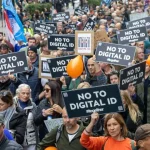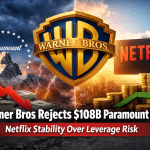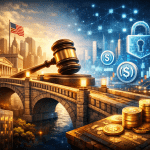America just watched another bullet rip through its democracy, this time claiming the life of conservative firebrand Charlie Kirk on a Utah campus stage.
On September 10, 2025, conservative activist and Turning Point USA founder Charlie Kirk was fatally shot in the neck during a “Prove Me Wrong” event at Utah Valley University in Orem. Videos from the crowd capture the moment the shot rang out, people ducking and screaming, and Kirk collapsing as blood pours from his wound.
Law enforcement quickly launched a multi-agency manhunt. Initial reports of a suspect in custody were later walked back: an individual was questioned and released without charges as authorities clarified that the shooter remains at large. Reuters reports that officials believe the shot was fired from a rooftop or elevated structure some hundreds of feet away, suggesting a planned sniper-style attack.
The Utah governor, Spencer Cox, called the killing a “political assassination” and described it as a stark sign of a broken democracy. President Donald Trump responded with a message of grief and vowed justice, blaming ideological foes on the political left for creating a climate of violence.

Charlie Kirk with Donald Trump on stage at a pro-MAGA rally, highlighting their close political alliance.
Political Violence Is A Daily Reality In The U.S.
This killing is not an isolated incident but another grim milestone in a rising trend of political violence in America. Experts warn the country is locked in a vicious spiral—a feedback loop of escalating rhetoric, social fragmentation, and increasingly lethal outcomes.
In Minnesota earlier in 2025, two Democratic state legislators were shot in their homes, one fatally. Even in the 2024 campaign season, assassination attempts and politically motivated shootings have become more frequent. Analysts cite a confluence of factors: deep political polarization, the amplification of extremist voices via social media echo chambers, and the ready availability of firearms.
As one expert put it: political violence in America has become a “feature” of daily life, not a shocking aberration.
Where Ideology Meets Lethal Force
Charlie Kirk’s public persona was built precisely at the intersection of provocative conservative ideas and youth mobilization. He founded Turning Point USA, and his “Prove Me Wrong” debate tour reached thousands of college students, often sparking heated exchanges on topics like gun rights, transgender issues, and the role of government according to CBS News.
His willingness to meet critics face-to-face—on campus quads, in Q&A formats, under tents emblazoned “prove me wrong”—made him both beloved by supporters and hated by opponents.
But that very public bravado also exposed him to danger. The shooting appears to have been premeditated, and Kirk was surrounded by thousands of students but was nonetheless vulnerable. The tent where he spoke served as a stage for free speech—and, tragically, for a lethal attack.
What’s more, the incident immediately became freighted with political meaning. Whether or not the shooter had an explicitly ideological motive, the killing will almost certainly become a symbol—a martyrdom—for the conservative movement, deepening the divide and stoking calls for retaliation or repression.

Charlie Kirk shares a joyful moment with his wife Erika and their two children at a family birthday celebration.
The Toll On Political Discourse
Personally I’m fed up with all the arguing and violence. We now live in a world where people agree on 99 percent of issues, but the 1 percent they disagree on gets weaponized—used as fuel for tribalism, outrage, and, increasingly, tragedy.
If Kirk’s killing teaches us anything, it’s that public life in America has lurched beyond conflict into combat. The incentives of outrage media and the logic of culture wars reward extremism, demonization, and escalation. Then, when an actual crisis happens—like a shooting—everyone doubles down on blaming “the other side.” Violence begets violence, and the cycle spins faster.
The damage isn’t confined to the victims. Campaigns, public universities, even ordinary citizens now must weigh security over openness, suspicion over dialogue. Free speech itself becomes harder, public debate more dangerous. When one side claims martyrdom, the other side feels persecuted, and the center frays.
We urgently need to reclaim common sense and human decency. People on all sides of the political spectrum share most of the same core values—safety, fairness, dignity, opportunity. It’s time to stop weaponizing the few things we dispute and start working together, seriously and respectfully, for the betterment of society.
What Else To Watch
Political institutions are responding with alarm. State and federal officials—from Utah Governor Cox to the National Governors Association—issued strong condemnations of violence and called for renewed dialogue and protections for public discourse.
Universities are under increasing pressure to rethink event security, venue layouts, protest protocols, and speaker invitations. Whether a university should host inflammatory figures, or how to balance free speech with safety, is now a live question with tragic precedent.
And social media platforms are again under scrutiny: from rapid video uploads to real-time public debate, political events now unfold in digital real time—and sparks fly both online and offline. Many of the recent political shootings were livestreamed, filmed, or debated within minutes of occurring, accelerating responses and amplifying trauma.
Some analysts argue we are in a new stage of political violence in the U.S.—not isolated “lone wolves,” but a systemic crisis driven by institutional breakdown, polarization, and a collapse of shared norms.

Charlie Kirk fiercely debates opponents on stage, showcasing the confrontational style that made him a polarizing figure in campus politics.
FAQs About Charlie Kirk's Shooting
Why weren’t security checks stronger at the event?
Utah Valley University provided police protection and Kirk traveled with private security, but the event was outdoors, with a large crowd and minimal physical screening. An elevated sniper-style shot may have circumvented traditional entry-point security entirely.
Has a suspect been identified or arrested?
Not yet. Law enforcement initially detained a person of interest, but that individual was released after questioning. Investigators believe the shooter remains at large, and the case is an active, ongoing manhunt.
Is this the worst instance of political violence in recent U.S. history?
It is among the most dramatic and symbolically charged. But it is part of a much larger wave: since the January 6, 2021 Capitol riot, analysts have documented over 300 politically motivated violent incidents. Other high-profile examples include the Minnesota legislator shootings and past assassination attempts linked to political polarization.
What can be done to lower the risk of political violence?
There’s no easy fix—but practical steps include improving event security protocols, promoting cross-partisan dialogue and de-escalatory rhetoric, tightening access to high-powered firearms, and investing in institutions (like universities and media) that encourage debate over demonization. Ultimately, rebuilding mutual trust and human dignity needs to supplant the logic of “us vs. them.”

Charlie Kirk beams with confidence and energy as he speaks to a rally crowd.
Final Thoughts
America’s politics have become a blood sport. The killing of Charlie Kirk is tragic evidence. But if we refuse to be disarmed—not just with weapons, but with reason, decency, and empathy—there’s still a chance to stop the bleeding. We need to turn away from the obsession with division, the constant magnifying of differences, and instead focus on the overwhelming common ground that already binds us together.
Most Americans want the same basic things: safety for their families, opportunities for their children, dignity in their work, and fairness in their communities. If we can commit to elevating those shared values above the toxic noise of partisanship, we can build a society where disagreements don’t lead to death sentences. The only way forward is to replace the culture of conflict with a culture of cooperation—so that no more lives are lost to the senseless violence of politics turned into war.
Other Stories You May Be Interested In:
How Much Would Jeff Bezos Be Worth If He Never Divorced MacKenzie Scott?














